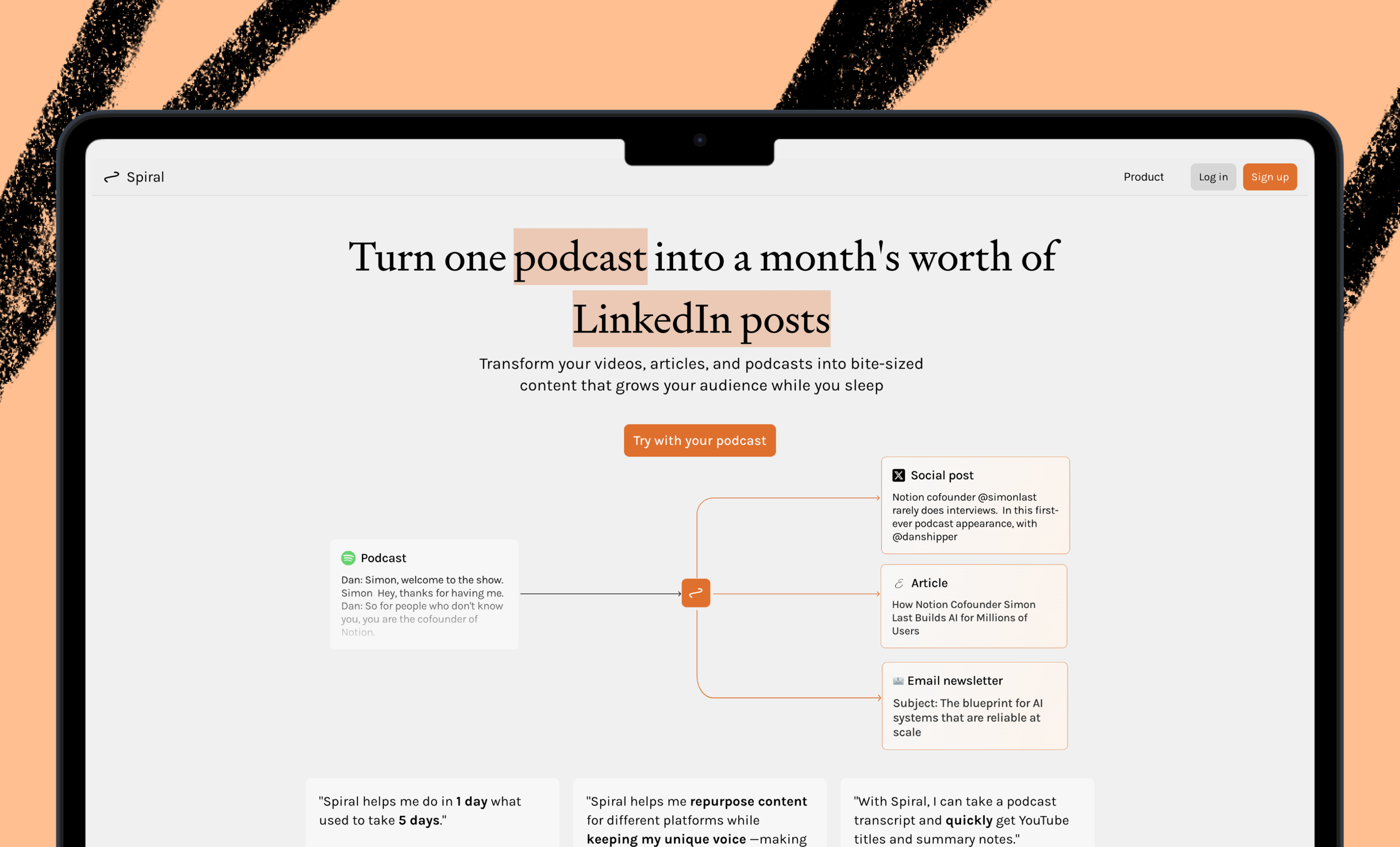
TL;DR: Today we’re releasing a new episode of our podcast AI & I. I go in depth with Dwarkesh Patel, host of the Dwarkesh Podcast, where he conducts deeply researched interviews with experts across AI, history, and geopolitics. We dive into how he uses AI to read, learn, and accelerate his intellectual growth. Watch on X or YouTube, or listen on Spotify or Apple Podcasts.
Dwarkesh Patel might be the smartest learner I’ve ever met.
Dwarkesh is the host of the Dwarkesh Podcast, where he conducts deeply researched interviews with guests like Mark Zuckerberg, Tony Blair, and Marc Andreessen.
Before conducting each of these interviews, Dwarkesh learns as much as he can about his guest and their area of expertise—AI hardware, tense geopolitical crises, and the genetics of human origins, to name a few. He does this by researching extensively, and recently, he integrated AI into his process.
Dwarkesh is using LLMs to revolutionize how he reads, learns, and builds a coherent worldview. In this interview, I turn the tables on him to understand how the prolific podcaster uses AI to become a smarter version of himself. We get into the learning system he swears by, how he uses AI to prepare for the interviews, and what fuels his insatiable appetite to know more. We also use Claude live on the show to help Dwarkesh research for an upcoming podcast recording. This is a must-watch for curious people who want to use AI to become smarter. Here’s a taste:
How Dwarkesh uses AI to become smarter
Inspired by an interview with researcher Andy Matuschak, Dwarkesh has become a strong advocate of learning through spaced repetition—a technique to review information at gradually increasing intervals to improve long-term retention. Here’s how he uses AI to augment his process:
- LLMs for lasting memory. When Dwarkesh is learning a new concept, he uses LLMs to put Matuschak’s method of spaced repetition into practice. “I have come up with a couple of different workflows that..make sure I’ve reinforced what I’m reading…a tool like an LLM is very helpful because it gives you content in another context and it can quiz you if you want,” he says.
- Automate prompt writing. Dwarkesh uses LLMs to process information about writing good prompts for learning through spaced repetition and, subsequently, generate the actual prompts. “I copy-pasted some of the things in Andy Matushak's post about how to write good prompts, and I just asked Claude to make those prompts for me,” he says.
- Use AI to build understanding. While reading about a new topic, Dwarkesh inputs the relevant text into a LLM and uses the AI-generated prompts to build a spaced repetition system that gives him the “lay of the land.” “[I]t's given me a bunch of question-answer pairs that consolidate the key things I need to understand…a lot of the things where it's like, ‘If you don't get this, you've totally missed the boat here,’” he explains.
How Dwarkesh uses AI in his podcasting workflow
Dwarkesh begins his research for an upcoming podcast interview by uploading context about the guest’s field—like books and academic papers—to Claude, using the model’s project feature. This is how he goes deeper with AI:
- LLMs to build context. As Dwarkesh prepares to interview a guest for his podcast, he poses questions to LLMs in order to understand the broader context of the guest’s area of expertise. “I really can’t ask good questions unless I have a good mental model of what’s going on, what they’re talking about, [and] I get where all this fits together,” he says.
- Deepen expertise with AI. While asking Claude questions, Dwarkesh uses the LLM as a sounding board to validate and refine his grasp of his guest’s field of expertise. This back-and-forth with Claude helps him discern if he’s “found a blind spot in their thinking” or if he’s simply “confused by their ideas.”
- Leverage AI’s knowledge gaps. Dwarkesh views an LLM's inability to provide good answers as an indicator of meaningful discussion points with his guests. Reflecting on his preparation for an interview with geneticist David Reich, he notes, “Now that I know Claude doesn't have a good answer, this makes it all the more interesting for me to ask David Reich.”
- Future-proof your workflow. While talking about using AI in his post-production process, Dwarkesh remarks that he integrated the technology into his workflow before it was mature enough to be useful, a bet that was paying off now. “I think we’re just getting in the practice of using these tools...it’s worth investing in getting…them to be part of your workflow so that as they keep getting better, you're getting the returns from that,” he explains.
Dwarkesh’s taste in books—and using LLMs to learn from them
Dwarkesh uses LLMs as a companion to read and understand dense books. For example, when he had a question that a “book didn’t even talk about,” he used Claude to “have [the model] explain what’s going on.” Here are his thoughts on the best books to read and how to use AI to learn from them:
- Seek consequential knowledge. Dwarkesh prefers nonfiction works that explore the consequences of their subject matter rather than focus solely on technical details, like Medieval Technology and Social Change by Lynn White. Referring to a chapter that explains how the stirrup fueled feudalism, he remarks, “I'm not into reading 500-page books about just how the stirrup physically worked…I do want to understand the implications.”
- Be wary of reductive theories. All the same, Dwarkesh is skeptical of books that claim to offer a singular explanation for the complex phenomenon in the world. His concise opinion on books like this is, “There'[re] ones that do it poorly, but just don't read the ones that do it poorly.”
- Biographies as time machines. Dwarkesh appreciates books that include detailed background context, like Robert Caro’s biographical series about Lyndon Johnson. The latter is “basically a history of the 20th century, but it has a very specific point of view or a specific locus—a character that's moving the story along—and I find those to be incredibly helpful in getting a full picture of what's going on in an era,” he says.
- Prioritize concepts over prose. Dwarkesh advocates for using LLMs to distill core concepts from dense texts, arguing that reading the author’s original words isn’t a prerequisite to understanding their ideas. According to him, if “you care about the ideas and you think the ideas are timeless,” the “specific syllables” or “kind of prose” that the author used don’t hold as much importance.
How Dwarkesh is building a coherent worldview
I asked Dwarkesh what fuels his thirst for knowledge. Here’s what he had to say:
- Connect ideas, create value. Dwarkesh’s quest to holistically understand the world drives his curiosity to consume information and transform it into valuable knowledge. He admires people who have “self-consistent and deeply interrogated world models” because “not only do they know [all] that stuff, but they can connect it in an interesting, compelling, and novel way.”
- Write to synthesize knowledge. In pursuit of building his own worldview, Dwarkesh publishes his spontaneous reflections about the information he’s processing on his website. “I've started writing riffs on different books or things I read,” that include “questions” and ideas about how the information is “connected with other things”.
The AI existentialist’s rapid fire
Dwarkesh offers quick takes on some of the most polemic AI-related issues we face today:
- The meaning of AGI. “[AGI] is not just that [the technology is] productive or can generate trillions of dollars of value, but really it's [when] it can replace a remote worker.”
- Dwarkesh’s AGI timeline. “I'd say, 25th percentile, maybe 2029, and then 75th percentile, like 2050.”
- Defining Probability of Doom, the AI apocalypse metric. “[S]omething along the lines of the thing that's taken over doesn't really have any sentient experience and it just doesn't have culture, doesn't have individuality.”
- The odds of P(doom). “Ten percent or something like that.”
You can check out the episode on X, Spotify, Apple Podcasts, or YouTube. Links and timestamps are below:
- Watch on X
- Watch on YouTube
- Listen on Spotify (make sure to follow to help us rank!)
- Listen on Apple Podcasts
Timestamps:
- Introduction: 00:01:44
- How Dwarkesh uses LLMs to remember everything: 00:05:37
- Dwarkesh’s taste in books and how he uses AI to learn from them: 00:11:50
- Why it’s important to be an early adopter of technology: 00:17:58
- How Dwarkesh uses Claude to understand complex concepts: 00:20:44
- Dwarkesh on how you can compound your intelligence: 00:26:36
- Why Dwarkesh is on a quest to know everything: 00:28:21
- Dan and Dwarkesh prep for an upcoming interview: 00:39:19
- How Dwarkesh uses AI for post-production of his podcast: 1:04:14
- Rapid fire on AI’s biggest questions—AGI and P(doom): 1:08:51
What do you use AI for? Have you found any interesting or surprising use cases? We want to hear from you—and we might even interview you. Reply here to talk to me!
Miss an episode? Catch up on my recent conversations with LinkedIn cofounder Reid Hoffman, a16z Podcast host Steph Smith, economist Tyler Cowen, writer and entrepreneur David Perell, founder and newsletter operator Ben Tossell, and others, and learn how they use AI to think, create, and relate.
If you’re enjoying my work, here are a few things I recommend:
- Subscribe to Every
- Follow me on X
- Subscribe to Every’s YouTube channel
- Check out our new course, Maximize Your Mind With ChatGPT
The transcript of this episode is for paying subscribers.
Thanks to Rhea Purohit for editorial support.
Dan Shipper is the cofounder and CEO of Every, where he writes the Chain of Thought column and hosts the podcast AI & I. You can follow him on X at @danshipper and on LinkedIn, and Every on X at @every and on LinkedIn.
Ideas and Apps to
Thrive in the AI Age
The essential toolkit for those shaping the future
"This might be the best value you
can get from an AI subscription."
- Jay S.
Join 100,000+ leaders, builders, and innovators

Email address
Already have an account? Sign in
What is included in a subscription?
Daily insights from AI pioneers + early access to powerful AI tools








Comments
Don't have an account? Sign up!
Dude, Dan you look like a kid in a fucking candy store when he shares the epub upload in the YT vid. haha
@devonitely haha thank you!! I love this stuff, and I'm glad it comes through :)